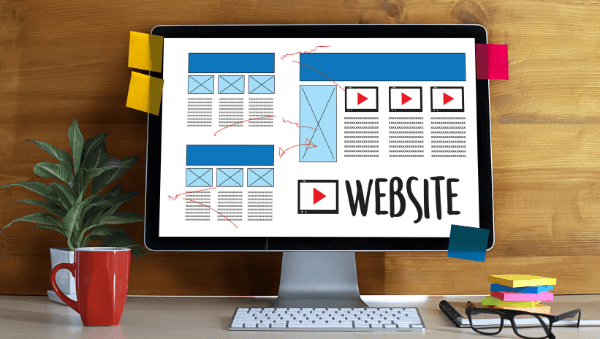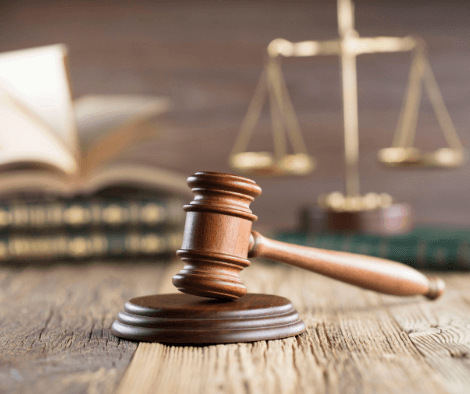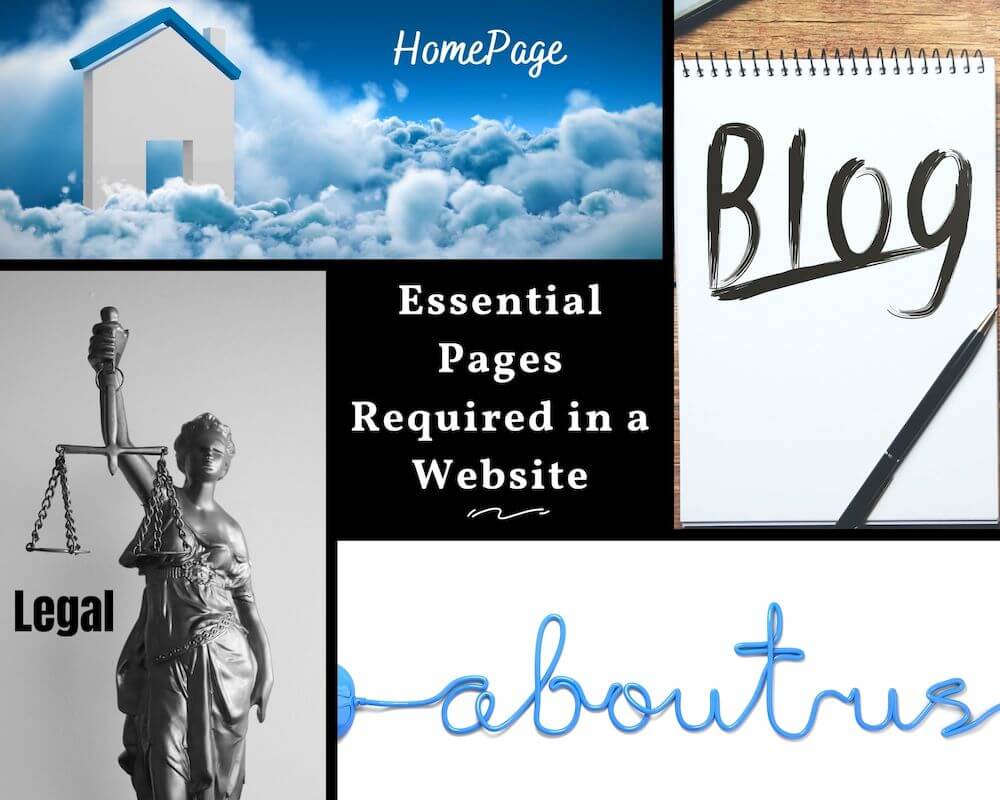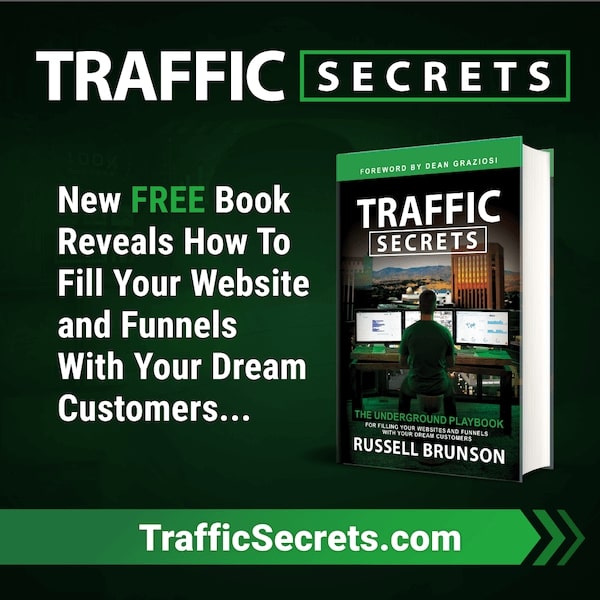The Essential Pages Required in a Website
A website is the user interface of almost anything on the internet and is necessary for anyone trying to build a brand or making their presence felt online. Starting its journey on Aug 6, 1991 when the first website ever created, by the European Organization for Nuclear Research, went live, the website prominence has come a long way. As on the date of this article in 2020 we have roughly 2 Billion websites scouring the internet, of which about 400 million are still active
The nature of websites has also changed over the years. In the late 90s and early 2000s websites were mostly used as a medium of communication with hardly any interactive interface. The websites now provide a much broader user experience and range from a simple interface of a search console like Google or Bing to enormous user driven interfaces such as Youtube, Facebook and Instagram.
No two websites are created equal. Every website has its own unique content and presence. However , there are still some essential pages required in a website in order to legally comply with the standards and be qualified to be indexed and ranked. These pages are as below
- HomePage
- About Us Page
- Legal Page
- Blog Page
This post will cover the details around the above pages highlighting the content and structure to maximise user experience. .
Disclaimer - please note this post is based on general websites. If the niche or content of your website is more regulated than normal websites, please consult an expert in your niche for further guidance or contact us at the contact information in the footer.

1. Homepage:
Homepage is the quintessence of your website and represents what you or your brand bring forth as value to your user.
A homepage is like the central counsel of your website that provides a view of what your website is about, your niche etc. in a structured format. Your goal is to build a good foundation of trust and transparency on your home page. This is what many site visitors see for the first time, and you need to ensure that you send a clear message about your brand and the goods and services offered. If your homepage is loosely laid out, the visitors will not be able to navigate and hence their interest in your content will drop dramatically.
According to a study, you have only 50 milliseconds to make an impression and attract someone to your webpage.
Yes, you heard it right "50 milliseconds !!" - that is less than 1/10th of a second to make an impression to your page visitors. That is how fast users decide whether they like or dislike your webpage.
Why is attention span so little? The answer is options. Chances are, for the same search, the user has the option of viewing 50 other websites. Hence if your website if not attractive in the first glimpse, your bounce rate will be high. Consider these 2 examples below
This is the homepage of Pacific North west, a company selling radiology Equipment. The first impression of their homepage is that it is loosely laid out, unsynchronized and almost repelling. There is so much going on in this homepage that’s it’s nearly impossible to figure what it is about in one glance. A close examination reveals the below:
- The website text, colors and contrast seem contradicting
- Bad typography and poor readability.
- Font colors are completely contradicting to the website design.
- No clear call to action button.
- No distinct contact us info. There is only a phone number which is listed way at the bottom.
- Flash is non responsive.
Now, lets compare this to Cone Instruments diagnostics - https://www.coneinstruments.com/
- This website is perfectly laid out which gives a clear cause and effect.
- The webpage is structured with prominent call to action in all areas
- Good color co-ordination between content and text
- All relevant information is clearly listed including contact info.
Looking at the 2 examples, it’s easy to say that any visitor visiting their websites is like to stay more with cone Instruments than with Pacific north west.
Things to consider putting in your HomePage:
Who you are
Describe briefly who you are. Include a short biography containing all the important details about you. Focus on things like your achievements, how your website started, your goals etc. You can link this bio to your "About us" page which we will discuss later in this blog post.
What you offer
Your homepage should give the vibe of the niche you are appealing to. Structure your homepage to showcase the products and/or services that you are offering. The information should be clear and concise. We strongly suggest using pictures wherever you can since a visual depiction has a stronger impact than text and would relay information better. A picture heavy homepage is also known to reduce bounce rate.
A full website guide
You should also provide a website map to guide your visitors towards the other pages on your site. This will help them navigate more efficiently. I suggest using grids such as I have used in my homepage. A grid is basically a group of posts structured in a particular category. An example in my homepage is “Starting a Blog. Anyone who is interested in starting a blog can visit this grid and can get all the information needed in that particular category.
Note, that you should keep your homepage brief and to the the point. For details people can visit the posts and other pages which you have specifically structured in your website. The homepage content should give enough information for people to understand what you offer them, and how they will benefit from using your services.

About Us Page:
The second in the list of essential pages required in a website is the About Us page. Your About Us page serves as a virtual resume. Here, you can introduce your brand and sell yourself.
Once you have a visitor hooked to your homepage, it is likely that the site visitor would want to know who the owners of the page are. Your About Us page will help relay this information to your users. This will also be your visitor's basis to judge your credibility in your field of expertise.
Things to consider putting in your About Us Page:
About the Brand
Introduce the Brand to your visitors. Specifically highlight what your Brand is all about and highlight your journey. People always like a story format, so its important to keep them entertained with a story like description about how the idea came in effect and how it went from the idea to the website that it is now. Highlight the products and services and explain why they are different from your competitors. See an example below from an authority website Hootsuite:
Mission and Vision
There are many factors that can affect your visitor’s interest. One of them is the values that you represent. Include the mission and vision of your brand to highlight your plans in delivering quality products and services and making it into a better platform. Provide the values that you believe in and incorporate them into your brand.
Timeline
This is an optional but powerful method of building interest and trust with your visitors. Include a timeline that shows the evolution of your business, or blog. Start by explaining how the idea of building the website or brand started and how it evolved into the journey of entrepreneurship.

Highlight the key milestones you achieved in your journey and mention the mistakes. People like a good story and that just adds to the authenticity of the website.
Workforce
People are always keen to know about the person or team behind a good looking product. Introduce yourself or your team in neatly laid out section. Share the details about the founder and team behind running, maintaining and servicing the website. Creating a personal touch by inserting pictures in action and writing brief introductions about the team is a good way to provide clarity and build trust with your users. Use bullet points and focus on writing a short but impactful story. This also provides an opportunity to highlight any expertise which may act as a catalyst for users to engage more in the website and its product and services.

3 Legal Page:
The Legal Page of a website contains all legal agreements that a user must adhere to. Legal agreements relate to your website’s policies and what you expect from your users, plus what they can expect from you.
The contents of the legal page are divided into the below subsections (as listed below). Each sub-section is then expanded and encompasses its own details. In many websites the sections are structured as their own page. In this case - the number of legal pages go from 1 to many.
The broad subsections include (but not limited to):
- Privacy Policy
- Terms and Conditions
- Copyright Terms
- Cookies Policy
- Add on - Affiliate Disclaimer (only if you are an affiliate)
Your legal pages are extremely important. It is your preventive measure against law-related issues that can arise in the future. While there are generic versions of the legal policies which you may implement in your website, for pages specific to your niche, you may opt the services of a lawyer who specializes in your niche and can help you guide through the legal steps.
Types of Legal Page:

Legal Page - Privacy Policy
Websites are accessed through online connections. Online connections generate footprint of every visitor who visits your website. This footprint can be in the form of private information such as name, address, phone number etc. which you ask of your visitors or financial information such as bank information, credit card details etc.
It is important that your consumers feel safe when they visit your website. A proper transparency through your Privacy policy will ensure that your website visitors are happy about the safety of their private information.
The questions your Privacy Policy page must answer is as follow:
1 - What kind of personal information will be collected?
Your privacy policy must clearly define what kinds of private information will be gathered by the system. Some examples are demographical data, bank accounts, contact information such as phone number, email address, location etc.
2 - Who will have access to the information shared?
It is imperative that your policy maintains transparency on who is accessing the private information being collected through your website. It is also important that the visitors to your website know if the website is not the only platform which stores their information and if it is being shared with any third parties. In case where the information is being shared to third parties (such as merchant account vendors, payment gateways etc) the policy should clearly mention who those third parties are and their names, contact etc.
3 - What will be done to the information obtained?
The Policy must elaborate where the shared information will go and its purpose so users are well aware of the risks if any involved.

Legal Page - Terms and Conditions
The terms and conditions on your website are the rules that your consumer must follow in order to continue using your service. It specifically mentions the rules and regulations that a visitor is obliged to follow to legally use your content and have respect of your intellectual property.
These rules may include the below:
Intellectual Property rights:
Specifically mention that all contents text, pictures and videos are intellectual property of the website. Any visitor to the website only has limited license for purposes of viewing. They do not have the right to copy and reuse any content under their name.
Restrictions:
In this section it should be specifically mentioned that there are certain areas of the website which only the admin has access to and at any time this list can be expanded to include other areas as well per the company discretion. Mention specifically that the visitor is restricted from engaging is any of the below:
- Republishing the Website content in any other form or media
- Commercializing any of the website content without prior permission from website owner
- Publishing or showing Website content to public
- Use the content of the website in a way which damages the reputation of the website / owners
- Using the website illegally and against the applicable laws and regulations which may cause harm or damage to anyone associated with website
- Engaging in data mining, harvesting, extracting or similar activity in relation to this Website
- Using this website for personal advertising and marketing
Your (Visitors) Content:
- This part of the policy should specify that if any visitor posts on your website then by default you have a non-exclusive, worldwide irrevocable, sub licensable license to use, reproduce, adapt, publish, translate and distribute the content any and all media.
- Further the content so posted should not violate any third party rights
- Also the content can be deleted and moved at your sole discretion
Limitation of liability:
Specifically mention here that you are not specifically liable for any liability arising with the usage of the Website and that users have no rights to enforce such liability under contract.
Age Restriction:
Most websites, especially those that require payments or those with mature content, require their audience to be 18 years old and above. You need this to avoid issues concerning minors.

Legal Page - Copyright Terms
Define clear rules in regards to copyright issues which will help prevent plagiarism or the use of your content without authorization.
Having an effective set of terms and conditions will help make your website safe not just for users, but also for you, as the owner. This will serve as your defense against possible legal issues caused by your consumers.

Legal Page - Affiliate Disclosure
Affiliate products are more commonly seen on bloggers’ pages. Affiliate programs require their affiliates to openly state the paid relationship between the parties.
This is only a short notice that may consist of the following disclaimers:
What does Affiliate Mean
Explain in a layman language what affiliate means and then briefly states the terms and conditions of your affiliate partnership.
Put a disclaimer that you may be paid to promote affiliated products product.
Mention the website’s affiliation with affiliate marketing and that you may get paid for advertising the product or service in your platform. This will avoid fallacies about you and the product being advertised.
The most important part is to let your consumers know that once they avail the product using your affiliate link, the product’s original price won’t change, but you will receive a commission as a part of a negotiation.

Legal Page - Cookies Capture Policy
Under the legal essential pages required in a website, this is one of the most important disclosures you need to make in your website.
Website cookies are the the most common form of private information which can be tracked online.
What are website cookies:
Cookies are a small piece of information a website sends to your computer which tracks your movement on the website. This information is stored in your web browser and is activated once you revisit that website again. The function of the cookie is to maximise user experience.
An example of a website cookie would be language. For instance you log into a website and change the language form Spanish to English. The next time you visit the same website, it would automatically be in English. The cookies stored in your browser will transit the information to the cookies stored on the website to display the content in your preferred language selected earlier.
In the US, Pursuant to data breaches by companies such as Facebook, the Behavioral Advertising Principles now require websites to disclose their use of cookies to their visitors when collecting sensitive information. The visitors need to explicitly give consent before any private information can be stored. Further, the website operators also need to provide an option to opt-out of the data collection practice along with the guidance on how to do so.

4. Blog Page
A Blog page houses a series of posts which are related to your niche where you focus on creating more value to the consumers while not directly tempting to make a sale. An example of a blog post would be a website which deals with real estate and which maintains a blog of what to look for in houses while buying. Here the blog is related to the niche but not directly tempting to make a sale. The Blog features content which enhances user experience and help build a connection with the buyer who may then be interested in using the services to shop for some real estate.
You don’t necessarily need to make a separate website for your blogs. If you are a store owner or a service provider, you can incorporate your blog pages into a different section of your existing website and highlight that in your homepage.
Why is a Blog Important?
Blog Pages provide a lot of insights to a website, some being:
Increases Credibility
Writing plenty of informative blogs can level up your reputation in your industry. It makes you credible, not only to users but also to search engines. This will help you increase your trust rating, which can result in attracting more traffic.
Better SEO
Search Engine Optimization or SEO is an important element that your website should have. You need SEO to rank in search engine result pages. Blog articles can help you establish your authority for certain keywords.
Better Audience Engagement
As you write more and more content, more and more people will also turn to you for advice or inquiries by commenting on your articles or contacting you through your website. This will increase customer recognition and leads engagement which can help boost traffic and sales.
If you have no time to write for your blog, you can always avail the services of an affordable freelance copywriter. Spend more of your time marketing, and let the freelancer do the writing. Click here to find out how to outsource blog posts for your website.
Summary: Essential pages required in a Website
In a nutshell the above 4 pages make up essential pages required in a website. Incorporate them one by one to boost your websites rankings and traffic. If you want to focus on creating real content and not engage in creating legal pages etc, you can always use free templates that you can find online, and simply get the content that applies to your business.






